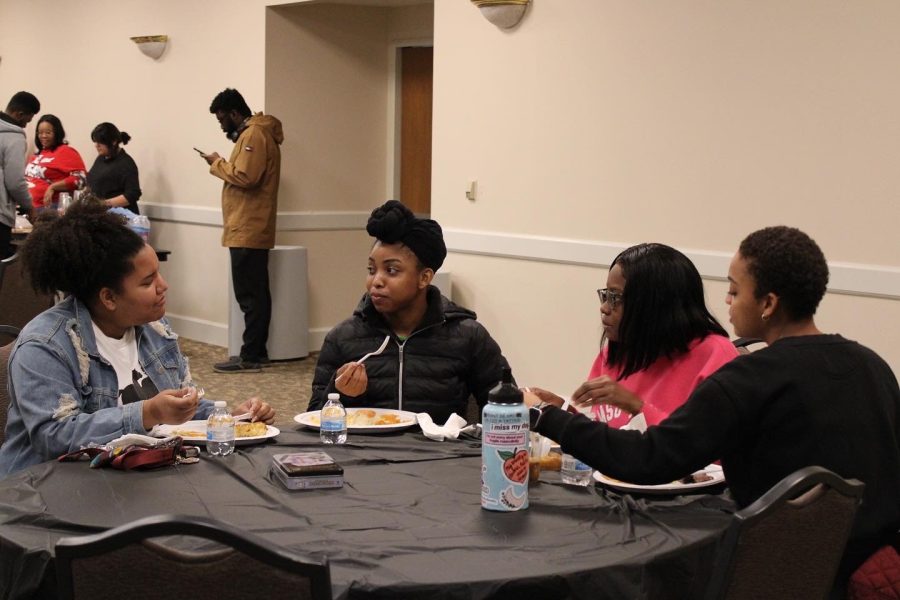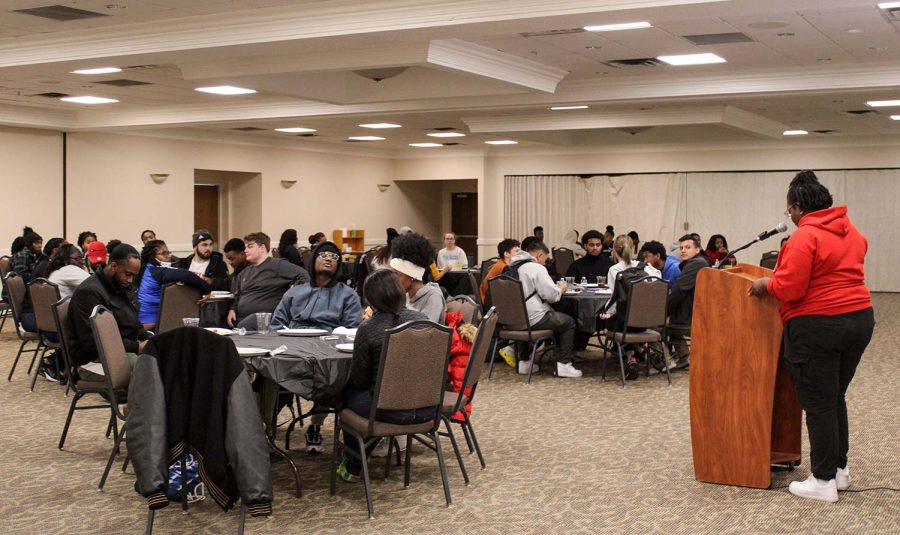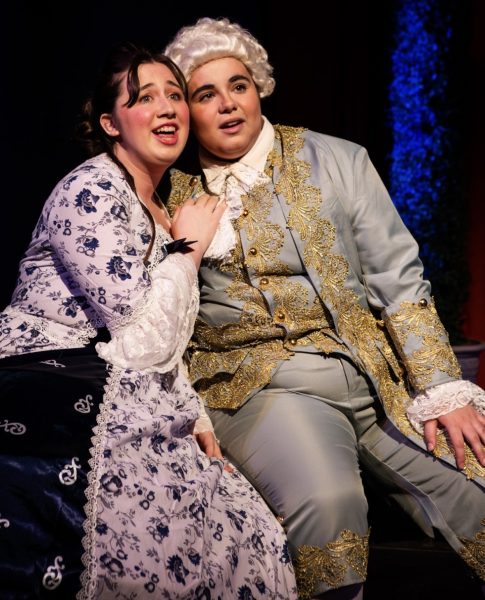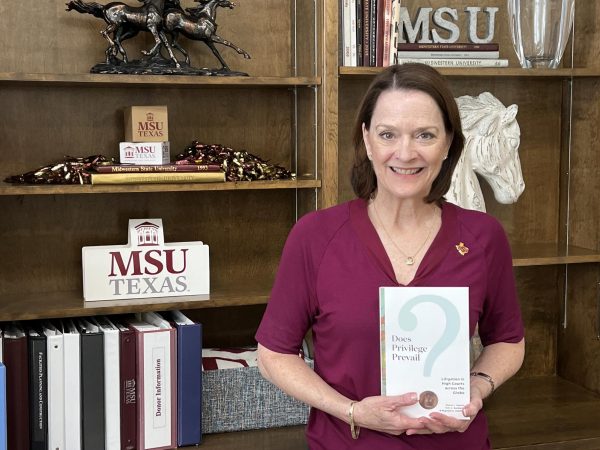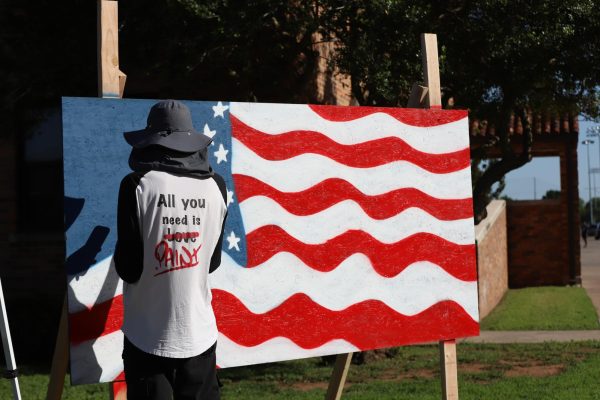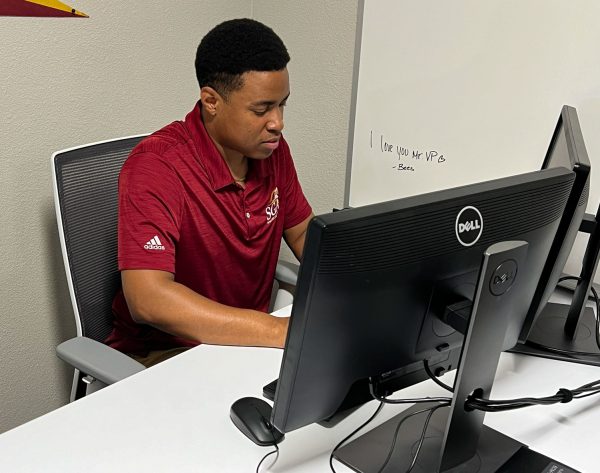“I am the Black Print” a Black History Month Celebration
Students sit together and enjoy the food and music of the Soul Food Social, Feb. 17.
The Black Print is this year’s theme for Black History Month at MSU. The Black Print is defined by the Black History Month Committee as ‘the first to influence all aspects of life; past, present, and future.’ This reflects Black History Month, which celebrates the achievements of Black Americans and recognizes their importance throughout US history.
“The Black History Month committee came up with the Black Print, looking at the different contributions that African Americans have played a part in within the United States’ history. The promotional shirts say “It’s influential in all aspects of life past present and future.” There’s so many things that Black American culture has cultivated and it’s continuously growing. People are constantly expanding on it. We’re constantly going back in time. We’re kind of bringing things to the forefront. There are things currently happening that are setting precedent for things that are happening in the future. I think that was the goal of why we chose to focus on that as a whole for the month and having the past, the present and the future, all aspects of life,” Jamilah Kangudja, coordinator of MOSAIC programs, said.
The Black History Month Committee came together to plan MSU’s Black History Month events. Within the committee, there was an education subcommittee that worked to provide information on Black History.
“We wanted to have events that encourage socialization and observe the Black History Month, but we also wanted to have events that people would feel they can be a part of and want to come out to. We can also promote our Black culture, Black history,” Gabriel Ling, Black History Month committee member and mechanical engineering junior, said. “We also had an engagement bar which was part of the educational aspect…which was very important because as great as having events [is], we are obviously going to push why we observe Black History Month and what’s important in our community and society, so we also add an educational aspect towards it. These events were chosen because we felt they would best suit our community, the student population and also promote observance.”
The month began with the exhibition opening reception of The Legends Project: Charlye Ola Farris, a traveling exhibition that honors Charlye Farris, the first African American woman licensed to practice law in Texas, become an attorney in Wichita County and serve as a judge in the South since Reconstruction. The week was then followed by snow days that called for a rescheduling of events.
“The committee is responsible for three events that have been on this calendar. We’ve had the intro event which was supposed to be the Aux Wars, but the snow days kind of pushed the event back. But we decided instead of doing that event that we would do the soul food social,” Kangudja said. “The soul food social was our intro welcoming event for Black History Month or kick-off event if you want to call it. Because of the snow day, we still wanted to do something so we did do a snowed-in kickback for students to come to in the Legacy MPR.”
Events that followed were hosted by organizations across campus such as the Wichita Falls Museum of Art, the Black Student Union, Speakers & Issues Committee and the Department of World Languages & Cultures. The Black History Month Committee also included the Wichita Falls community by partnering with 9th Street Studios to host the 9th Street Studios Artist Talkback with Jackie “Juba” Davis.
“We also worked with 9th Street Studios to get an artist named Juba to come here and talk about his art, but more importantly really just talk about his story and it was an emphasis on trauma, talking about trauma and then seeing how he turns something like trauma into artwork and how it turned him into the person he is today,” Kangudja said.
Other groups within MOSAIC such as WISE and MOCA, groups that focus on women and men of color, hosted events. The LGBTQ+ STAND Council Coordinator, Bella Muniz, hosted a poetry night to acknowledge James Baldwin, a Black American poet.
“It was just all little ways to make sure we kind of commemorated people, acknowledge people and kind of celebrated those contributions that Black people have made,” Kangudja said.
When speaking on the importance of having Black History Month events at MSU, Ling says it’s important to remember the positive. Ling points to Carter Woodson, who wanted to commemorate and celebrate the achievements of Black people. Woodson started Negro Week in February, which developed into Black History Month.
“These events are very important because they help us remember all our input into society, especially Black people. We tend to focus so much on the negative sometimes and that’s not a good thing because we’re so ready to involve in any movement towards the negative side, speaking out against racism…but then we forget sometimes that we should also be more positive. Look at the positive impact of our people. Look at the accomplishments and celebrate those,” Ling said.
Black History Month Committee was going to host the last event for Black History Month, the Black Excellence Gala. However, due to icy roads, the event and classes were canceled.
“Yes, the snow has affected us twice, but through it all, we’re still grateful that we could have got the events that we did have and they were pretty successful. I am happy for that,” Ling said.
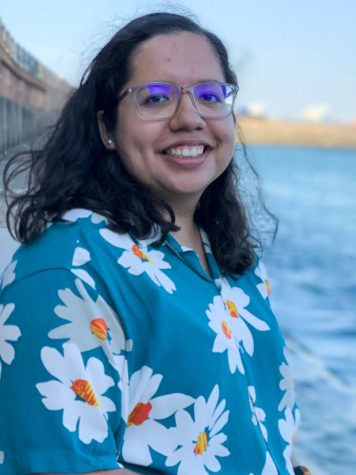
Hello! My name is Stephanie Robledo, and this upcoming fall will be my third year with The Wichitan. Previously, I was news editor, but this time I’m...



